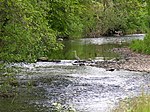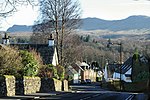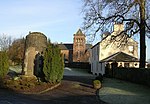Balfron railway station
Disused railway stations in Stirling (council area)Former North British Railway stationsPages with no open date in Infobox stationRailway stations in Great Britain closed in 1951Railway stations in Great Britain opened in 1856 ... and 1 more
Use British English from February 2017

Balfron railway station was a railway station that served the village of Balfron in Scotland. The station was served by trains on the Strathendrick and Aberfoyle Railway and the Forth and Clyde Junction Railway, both of which closed in the 1950s. The station was about 2 miles (3 km) away from the village that it served, therefore passengers and goods had to be transported by horse and cart to the village. A hamlet known as Balfron Station has since grown up around the site of the former station.
Excerpt from the Wikipedia article Balfron railway station (License: CC BY-SA 3.0, Authors, Images).Balfron railway station
Indians Road,
Geographical coordinates (GPS) Address Nearby Places Show on map
Geographical coordinates (GPS)
| Latitude | Longitude |
|---|---|
| N 56.074 ° | E -4.375 ° |
Address
Indians Road
Indians Road
G63 0SB
Scotland, United Kingdom
Open on Google Maps






